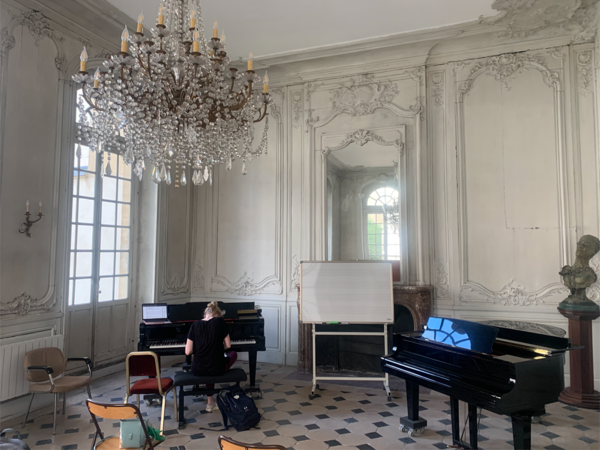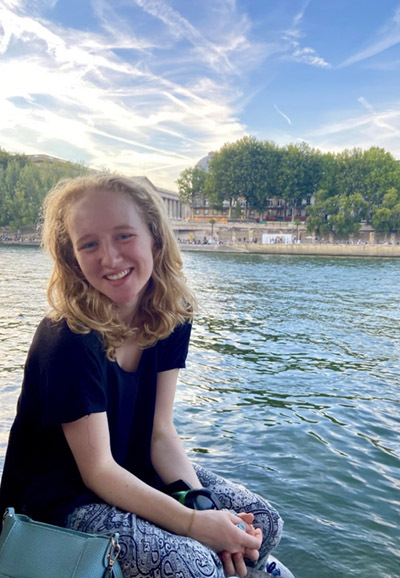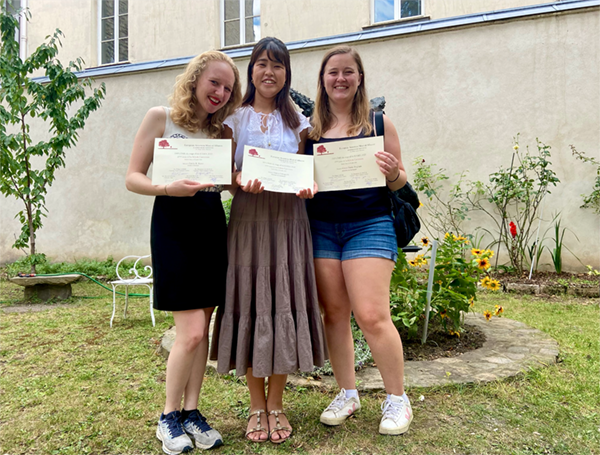
Emily Kane ’23 is a double major in music, with an honors concentration in clarinet performance and ACMS (applied and computational mathematics and statistics), as well as a minor in education, schooling, and society. She received a 2022 summer research grant from the Nanovic Institute for European Studies which, with additional support from the Notre Dame Department of Music, helped her attend the Summer Music institute of the European American Musical Alliance (EAMA).
“Oh my god, you’re gonna be Emily in Paris!” This reference to the hit Netflix show was how many of my friends reacted when I first told them that I had been accepted to the European American Musical Alliance (EAMA) Summer Music Institute in Paris. In fall of 2021, I started formally studying composition with Dr. John Liberatore, associate professor of music theory and composition and Nanovic Institute faculty fellow, and I realized I wanted to explore composition further. After searching for summer composition programs, I submitted an application to EAMA, not really believing that I would get in. When I saw the acceptance email, I knew I had to go. After I was successful in securing a grant from the Nanovic Institute, I headed off to Europe to explore and study music.
The education I received this summer was transformative. EAMA’s teaching style is based on the pedagogy of Nadia Boulanger, a renowned composer and pedagogue who taught many famous composers, including Aaron Copland, Philip Glass, and Quincy Jones. Her philosophy was that all musicians must have a solid grasp of the basics of harmony, counterpoint, and musicianship. This approach was evident during our classes at the Schola Cantorum, a historic private conservatory that was founded in the 1890s. Our cohort sang together in Chorale and took classes at varying levels of musicianship, keyboard harmony, and counterpoint. At the end of the program, we had an opportunity to sing in the nearby Church of the Val-de-Grâce, a 17th-century church that survived the French Revolution.

In addition to chorale, each of the four compositional specialties — composition, conducting, chamber music, and pedagogy — had its own classes. Among piano transcription, vocal writing, and orchestration, I chose orchestration because it is a field that interests me as an active participant in wind band, orchestra, and musical theater. We composers had smaller composition studios, where we gave and received critiques on each other’s work. Additionally, we each chose a specialized techniques class. The composition students also had the opportunity to submit works, some of which were chosen for reading and recording by professional groups. My string quartet was chosen, and it was amazing to hear it live and helpful to receive critiques from the faculty, my peers, and the players themselves.
I also met so many cool people through this program! Many are currently pursuing undergraduate or graduate education for music, but some had not majored in music at all, and some were already working professionals. The variety of ages, life experiences, and musical backgrounds among the student body reassured me that there are multiple paths through music and many ways to be a musician. Since I was slightly younger than the average student, I learned a good deal about graduate schooling and careers in music from master’s students, doctoral candidates, and conservatory professors. This allowed me to gauge what will be a good fit for my future.
My time in Paris also underscored the importance of public transit and environmental consciousness. Many of us lived at the Colegio de España en París in the 14th Arrondissement, close to the edge of the city. We commuted back and forth to class on the RER B, which underscored to me the importance of public transit and infrastructure — taking the train cut our commute time in half. Another memorable experience was a mid-July heat wave throughout the city. With temperatures reaching over 100℉, and no air conditioning in the Schola, some of our classes were canceled. We were fortunate to have air conditioning in the basement of the Colegio, but the experience overall reinforced to me the urgency of fighting climate change.
I also had wonderful experiences outside of class. At our dorm, my friends and I developed the concept of “Extra Chorus” where we sang through and conducted our peers’ compositions as well as the repertoire from chorale. We also held an extra composition studio the week before our submission deadline. One of my friends even wrote a trio for violin, viola, and clarinet inspired by our time in Paris, which we played at the Schola. Since my specialization at Notre Dame is technically in clarinet performance, I was part of the trio that played this composition and also played clarinet in a group with my piano friends. I made sure to visit the clarinet landmarks in Paris: marking two items off my bucket list, I tried out clarinets at the Buffet Crampon showroom and visited the Vandoren store, companies that are world leaders in the manufacture of wind instruments and reeds, respectively. While music took up much of our time, my friends and I made sure to see the city too! I absolutely loved the urbanity and the cosmopolitan ambiance. Some of my favorite memories include seeing the Eiffel Tower, the Musée D’Orsay, and the final day of the Tour de France.

This was a life-changing experience that gave me both deeper musical training and a wider network of professional musicians. The imposter syndrome I had at the beginning of the month melted away once I realized I had a solid preparation for the program, and at the end of the month, I graduated with distinction in harmony.
Now back at Notre Dame, I am working to share my knowledge, as president of the Composers’ Consortium of Notre Dame (CoCoND) as well as a senior music major, to foster a supportive and instructive environment for musicians and new composers. I hope that my experience can encourage many of my peers and younger students with a strong interest in music to believe in themselves and pursue transformative opportunities like this one.
Emily Kane’s String Quartet Take X (Summer 2022)
Originally published by at nanovicnavigator.nd.edu on December 21, 2022.